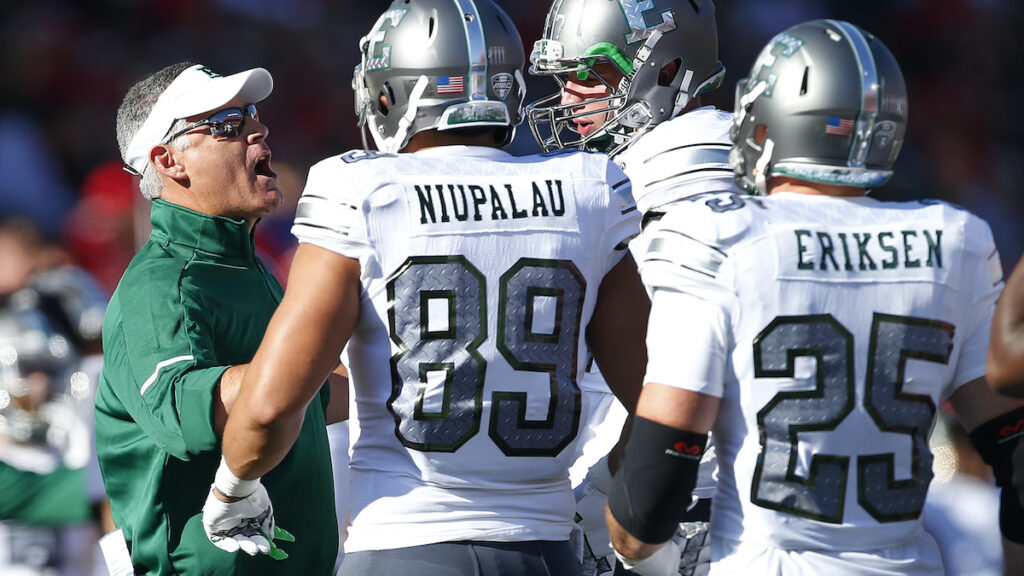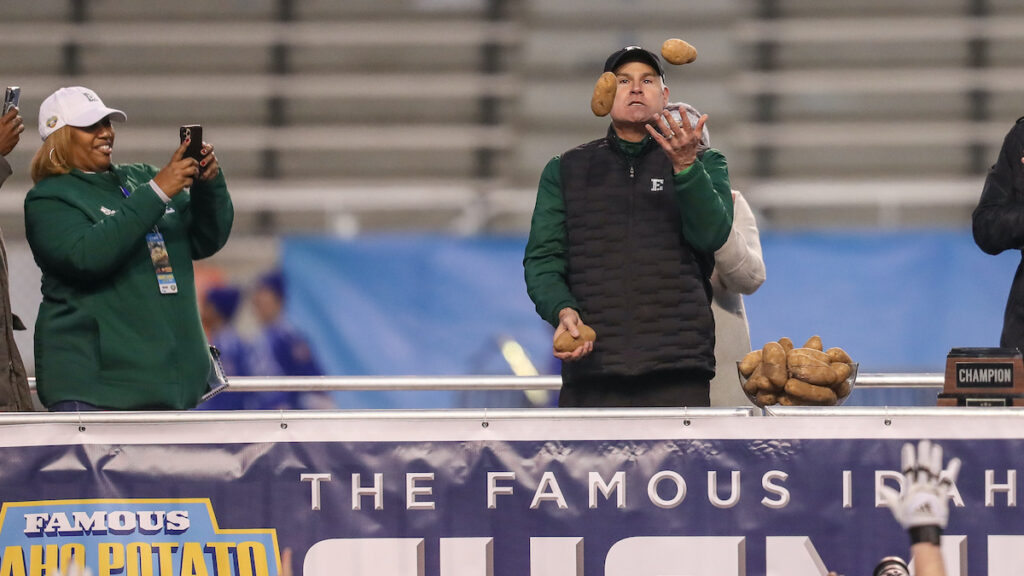‘Undeterred:’ Eastern Michigan’s Chris Creighton hasn’t met a coaching challenge he can’t best
It was a run of the mill 2016 morning in an otherwise trying year for then-Eastern Michigan athletic director Heather Lyke as she arrived at her office.
Lyke, who is now the Pittsburgh AD, doesn’t remember the precise date now, as the days then are best recalled as a hectic haze. Eastern Michigan was in the midst of a public discussion about the viability of its football program and the possibilities of moving down a level wasn’t an idle threat. Faculty and students produced a report that argued the program was a drain on resources and presented it to the Board of Regents.
And during the first two seasons under head coach Chris Creighton leading up to this, the Eagles won three games.
“The first two seasons, we were not a good football team on Saturday afternoons. I mean, we were not good at all. But I will tell you that everything that we were doing for the other 350 whatever days was working. I mean, the foundation, the commitment, the relationships, just the internal belief, all of those things were actually happening,” Creighton said.
But selling hope seemed like a longshot for what is, historically, one of the worst Division I football programs.
Even still, Lyke remembers a piece of paper lying on her desk with a single word — “Undeterred” — scrawled in recognizable handwriting. She walked to Creighton’s office and asked him about it.
“I went back down to his office and he’s like, ‘Look, that’s what we have to be.’ And I’m like, you’re right,” Lyke said.
More than five years later, Creighton is still coaching the Eagles and coming off back-to-back bowl games.
From realizing at a young age that coaching, not playing, would be his path to work in football to taking a job as a player-coach in Sweden shortly thereafter, Creighton has never shied away from a challenge in his career, no matter how daunting. And from a Superserien championship with the Limhamn Griffins in Malmö, Sweden, to leading winning programs at the NAIA, Division III, FCS and FBS levels, Creighton has crafted success at each of his destinations.
The success isn’t borne from having some secret sauce on offense — though Creighton is a former quarterback and coached some high-powered passing attacks — or assembling otherworldly talent (a non-option at his various gigs), but his ability to lead and get every player, coach and staffer working in harmony.
That, coupled with a faith-driven willingness to dive headfirst into a challenge that suits him, makes Creighton the coach he is today.
“I had never heard of Ottawa,” Creighton said. “I mean, I thought it was in Canada. But that’s how God works, right? I mean, it really is. I mean, if you look, if you study it and all that kind of stuff, it’s like, he grabbed a bunch of fishermen to be his disciples. He sends people and it’s just — it’s a crazy awesome life. So I went to Kansas, to Ottawa, which is not in Canada. It’s in Kansas.”
From Sweden to the FCS, Creighton doesn’t shy from a challenge
Creighton made his first big jump into the unknown when, in 1988, he left the West Coast to play college football at Kenyon College in Gambier, Ohio. After a successful career that featured Kenyon winning a first-ever share of a conference title, he was prepared to make a pivot completely away from football and teach Spanish to first grade students in Compton via Teach For America.
While being “absolutely fired up about that,” Creighton had a change of heart during the spring break of his senior year of college. Staying with a friend in Cleveland, they were up until 3 a.m. in the basement one night “breaking down” Creighton. They discussed his strengths, his weaknesses, his passions. By the end, Creighton had his epiphany.
“Man, I’m gonna be a college football coach,” Creighton recalled thinking.

On the advice of Jim Meyer, then his head coach at Kenyon, Creighton traveled to Youngstown State to meet with then-head coach Jim Tressel. Raised on the West Coast and living in the pre-internet age, Creighton knew nothing about Tressel when he went to watch a spring practice and talk with him afterward.
“This man starts talking about meetings and showering, and I thought I was listening to the President of the United States,” Creighton said. “And then he ended up spending like over an hour with me, afterwards, and gave me a copy of his winner’s manual.”
While Youngstown State didn’t have an opening for a graduate assistant then, Creighton was inspired and began a letter writing campaign. He penned letters to the likes Bobby Bowden at Florida State, Joe Paterno at Penn State and Lou Holtz at Notre Dame. He made a wall collage of the kindly-worded rejections on official letterhead.
But Concordia University in Chicago had an opening and for two years Creighton served as an offensive assistant while earning his masters degree. Eventually, it came time to look for another gig. He again circled back with Tressel at Youngstown State to see if there was an opening on staff. But before anything could be finalized there, Creighton got an unexpected offer.
“It seemed like every time he had something else going on,” Tressel said. “I remember one time, we tried to hire him and then he ended up going to Sweden or Switzerland or somewhere like that.”
Creighton’s lone year as head coach and quarterback for the Limhamn Griffins (then the Malmö Griffins) was an awakening. Not only was he a 20-something American trying to command a group of Swedish adults, but football wasn’t exactly their priority.
“And like the first practice, I mean, there’s guys smoking cigarettes beforehand,” Creighton said.
He wasn’t going to demand lifestyle changes from his players and teammates, but Creighton flexed some of his leadership muscle and beseeched his players for more commitment.
Once, the starting center had a two-week vacation scheduled with family during prep for the championship — he hadn’t planned on the team playing that long. He ended up traveling six-hours to be at practice during the week and then back to spend time with his family on weekends. Another player made sure to be on the nine-hour bus ride to the championship because they would be watching film and game planning, only to catch a pair of flights in less than two days to attend his parents 50th wedding anniversary while getting back in time to play in the game.
“And I was pretty serious and intense and loving it and all that,” Creighton said. “And they, they just totally bought in. I mean, it was one of those times in my life where I look back and it was like, the commitment level just rose.”
After seeing Swedish proof-of-concept for his coaching chops, Creighton returned stateside and took the offensive coordinator position at Manchester College — a position he got over the phone. Following three seasons and 10 school offensive records, Ottawa University in Ottawa, Kansas, offered him the head coach job there.
Coming off a 1-8 season the year prior, Ottawa went 9-1 in the first year under Creighton. It was a result of players being “radically committed,” he said. At an NAIA program in the late 1990s, year-round training and team activities weren’t the norm. Players would go home and work summer jobs and the like.
Under Creighton, they created two periods in the summer where players would return for a few days, workout and also get to go do something fun like attend a Kansas City Royals game.
One player, Floyd White, took a Greyhound bus 19 hours each way from Angleton, Texas, to be with the team for one of the workout periods.
“But you can imagine how ballistic I went about that, about how radical,” Creighton said. “You know what I mean?”
After a 32-9 mark at Ottawa in four seasons, Creighton spent seven seasons coaching Wabash College — incidentally in the same conference he once played in. Wabash went 63-15 under Creighton.
At Drake, an FCS school that doesn’t award football scholarships, Creighton still managed a 44-22 record from 2008-13. From the NAIA to FCS, he had built winners, occasionally from the ashes of a prior tenure gone awry.
Creighton and EMU were, ultimately, a perfect match
When Lyke — who worked for more than a decade in the Ohio State athletic department and overlapped with Tressel there — called the national championship winning coach to see who would be a good fit for the open Eastern Michigan job ahead of the 2014 season, Creighton was the obvious choice.
“I told her, ‘You know, Knute Rockne might have a hard time getting that turned around, but Chris Creighton won’t, if you’ll interview him,’” Tressel said. “And she did.”
To understand the success that Creighton’s fostered at Eastern Michigan, it’s important to know the history. Of teams that are currently in the FBS, only two have a worse program win percentage than Eastern Michigan’s 33.2%: UMass and Texas State, and both those schools have been in the FBS for fewer than 30 years. Eastern Michigan has been at that level for 48.

Prior to Creighton, the only coach with a winning record at Eastern Michigan was Jim Harkema, who also led Eastern Michigan to its only bowl appearance pre-Creighton: a 1987 California Bowl win over San Jose State. In nine-plus seasons, Harkema went 41-57-5, a 41.8% win rate.
Creighton, in nine seasons at Eastern Michigan, is 46-61 — a program-leading 43% win rate. A program that hadn’t been to a bowl game in three decades has played in five in the last eight seasons, including back-to-back bowls twice. In 2016, the same year of the faculty report on football, Eastern Michigan secured a sixth win and a bowl berth in mid-November. Lyke started getting passports for the team in anticipation of going to the Bahamas Bowl.
And while the university did make a commitment after the tumult of 2016 and constructed a new athletics and football facility near Rynearson Stadium, which helps, much of the credit for the contemporary success of Eastern Michigan football falls on the shoulders of Creighton.
“We needed someone who had courage, who had confidence in themself, who had proven success. And he had won everywhere he’s ever been,” Lyke said.
Given his track record and age — he turned 54 earlier this February — Creighton seems like a natural option for any Power 5 program looking to follow the model Kansas laid out in hiring Lance Leipold, who coached at lower levels before springboarding from the MAC to the Big 12.
But that’s just not Creighton. And the same faith that guided him to Sweden, Kansas and southeast Michigan is the same force keeping him in place for now. He’d rather retire at Eastern Michigan feeling he’d done right by his family and faith than the other way around.
If a new challenge that suits him does come along, it’s safe to bet that one thing will be constant: Creighton will be undeterred facing new obstacles, building yet another winner as a head coach.
“I’ll feel as though I’ve been where I was supposed to be,” Creighton said. “And I don’t think that there’s any better place to be in the world, than in God’s will. Eastern Michigan, you know, has been hard. We just talked about an off season that was unimaginable as a college coach. But I absolutely love it. I just do. I love our guys, I love our staff, I love our program. You know, what we have forged through all of that is really special.”